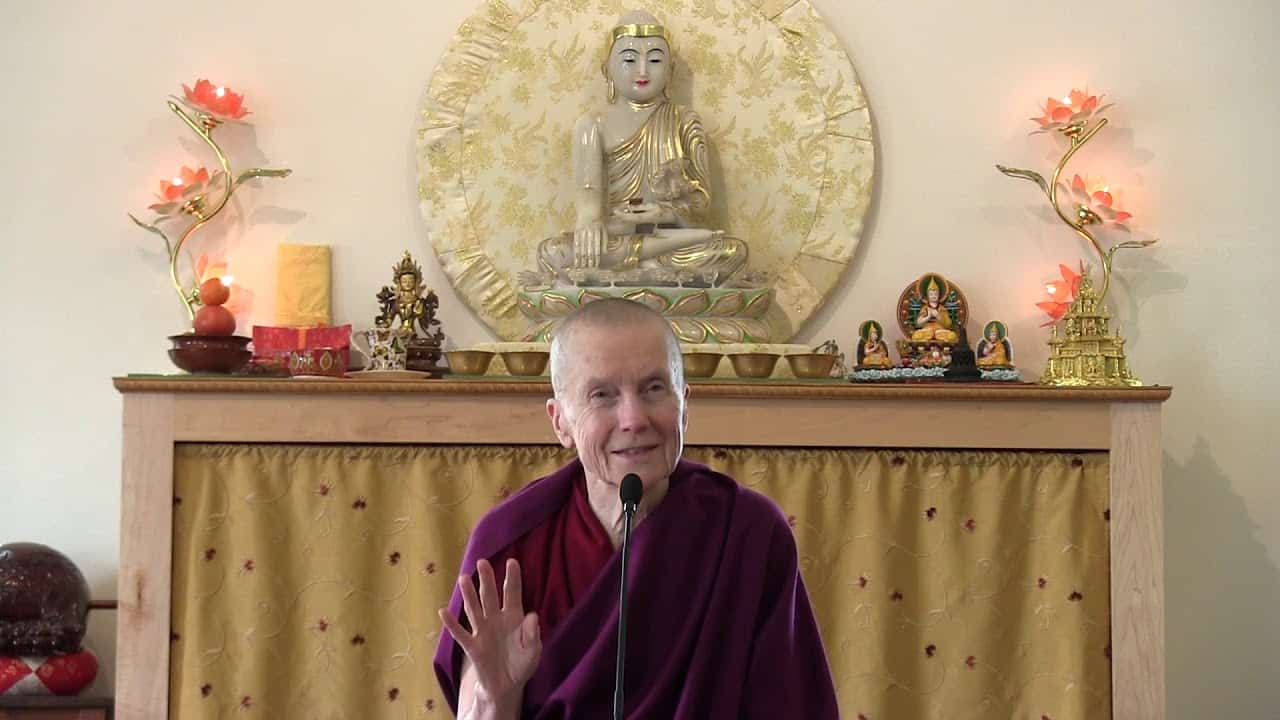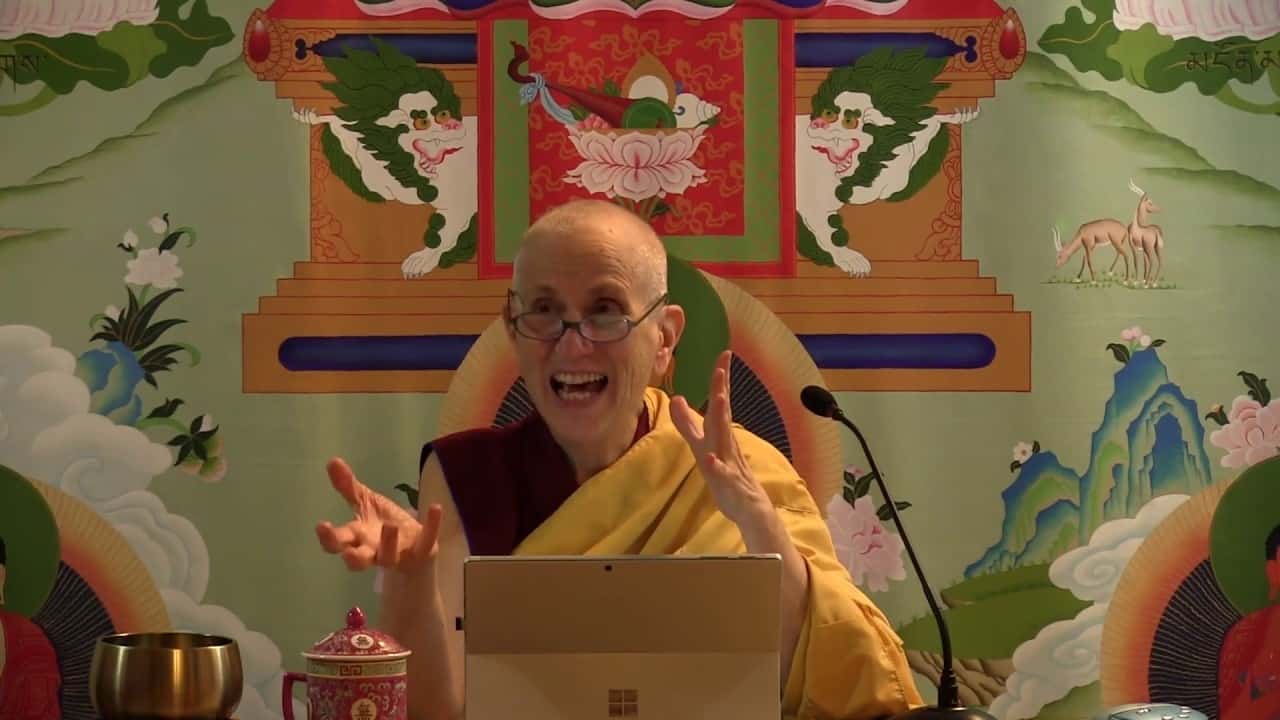The seven jewels of the aryas: Cultivating wisdom
Part of a series of short talks on the Seven Jewels of the Aryas.
- The wisdom knowing the ultimate truth
- The wisdom knowing the arts and sciences
- The wisdom knowing how to benefit others
The last (jewel of the aryas) is wisdom. Certainly you would expect wisdom to be in there talking about the jewels of the aryas.
When they talk about the perfection of wisdom, they talk about three kinds of wisdom. One is the wisdom realizing the ultimate nature, the lack of inherent existence of all parsons and phenomena. That’s the wisdom that liberates us from samsara.
The second is the wisdom knowing the arts and sciences. As we were talking a while back, that could mean learning grammar, poetry, and medicine. I think nowadays what we would do is expand it to really knowing something about science, sociology, anthropology, climate change, current topics, even about politics. The idea being that we want to be able to relate to people in the world, and to teach them according to what they need to hear, and what’s going to benefit them. So we have to know something about those topics. Otherwise we look like we’re completely archaic and the sangha will lose respect.
This is where a lot of my energy for dealing with social issues (comes from), because people write us and have difficulty with what’s going on in the country right now, and being able to address their needs and say things that will help them. And because the “Me Too” movement has been very strong. And climate change, as I mentioned. Now there’s the whole thing about taking children back who grew up under ISIS, but whose parents are foreign nationals, so do the kids get to come back to the West. What about the parents? What about the mothers who are foreign nationals, went to Syria, married an ISIS man. He got killed. They want to come back to the West now. There are all these issues, and I think we need to not weigh in so much with a policy decision, but instead talk about the ethical and compassionate concerns that lie behind these issues.
Similar with climate change. We’re talking about the ethics and the compassion. The policy-maker people, they know better about how to make the policy to achieve these goals. But we want to give the way of thinking behind it. So we have to know what some of these issues are.
Then the third kind of wisdom is the wisdom knowing how to benefit other sentient beings. There it has a list of at least 11 different kinds of people to make sure we benefit. We want to benefit all sentient beings, but there are 11 special groups. This list comes up in the ethics of benefiting sentient beings and in the joyous effort of benefiting sentient beings as well.
Here is where I think it can be very helpful for us—and this is relating to the second one, learning the arts and sciences—is learning things like nonviolent communication, mediation, a little bit about psychology–not a lot, but a little bit—because many people come and they have different problems, and it’s knowing a little about a psychological approach, because they may have been to therapists and been given some advice. So we want to help them and not just contradict things. Learning these other kinds of skills in the world that we can use to benefit sentient beings. So I think that’s quite good for us to do, too, as practitioners.
Those last two—learning the arts and sciences and then the wisdom of benefiting sentient beings—that pertains more to the conventional truths, what we see in the world and dealing with the multiplicity of phenomena. And the first one&madash;knowing the ultimate nature—is dealing more with the ultimate truth, how do things really exist. What is their deeper mode of existence.
The thing is, in Buddhist practice, we need to cultivate both of these. Learning the wisdom side is the method aspect of the path. And learning the benefiting sentient beings and the other topics that are studied in the world, that can become the merit side of the path, because we would use those things to benefit sentient beings, to create merit by benefiting sentient beings. There you have the method and wisdom side of the path. You have the collection of merit, the collection of wisdom.
Through the collection of merit, that primarily creates the cause for a buddha’s form body, which manifests out in the world to directly benefit sentient beings. That goes right in line with what you’ve been doing in terms of the wisdom benefiting sentient beings and the wisdom of learning the arts and sciences. And the collection of wisdom primarily leads to the dharmakaya of the Buddha, that means the empty nature of the Buddha’s mind, the true cessations of a buddha’s mind, and also the omniscient mind. So those three kinds of wisdom are going to lead us, together with all the other perfections, together with all the other practices that we do, to attain the two bodies of the Buddha.
I won’t go into the wisdom of the ultimate truth now. Because that could go on for a long time. But basically to say that the thing is to understand that the way we currently see phenomena is mistaken. Things exist, but they do not exist in the way they appear to us. The way they appear to us is if they had some entity from their own side. But when we examine deeper, we see that they can’t possibly exist like that. That they’re empty of having their own essential self-enclosed nature. Rather, they arise dependently. In that way they are mere appearances, and the appearance to our senses is false.
However, when we overcome all the obscurations on the mind, then the Buddha’s mind can see both the ultimate nature and the conventional nature simultaneously with one consciousness. That’s what we’re aiming for.
Audience: Venerable, where is the line between studying the arts and sciences to help your Dharma practice, versus it becoming a distraction?
Venerable Thubten Chodron (VTC): That is for you to know by looking at your mind. When your mind becomes more interested in these things than you are in the Dharma, you’ve gone overboard. If you start generating a lot of affliction in relationship to these things, then it’s time to pull yourself back.
For example, with climate change, if you start getting really angry. Or with the “Me Too” movement, you start getting really angry, then you’ve lost your Dharma motivation and that’s becoming a distraction, and actually something that’s really harming your practice.
Similarly with learning sciences and about physics and neuroscience and things like that, if we start thinking, “Oh, maybe anger is just what’s going on in the brain and there is no mind, the mind is just an emergent property of the brain, so anger is just what your neurons are doing,” and you start seeing your view change so that you no longer have a view, then you’re going down the wrong path.
The thing to do is, we have to really be very astute and always monitor our mind. It’s up to us to tell if we’re going to one extreme or the other.
Audience: My question is what is this list of 11 kinds of beings that we want to….
VTC: Oh, the 11. It’s helping the impoverished, helping those who are sick, helping those who are grieving, helping those who need help making a decision, helping travelers, people who are in danger, people who are reckless and need guidance in keeping good ethical conduct, people who are about to create some awful negativity, things like that.
Audience: Where does the wisdom understanding karma fit into that?
VTC: The wisdom understanding karma goes along with the wisdom regarding the conventional truth. That’s one of the foremost topics that we need to understand.
Let’s grow our wisdom, as well as the other six of the arya jewels.
Venerable Thubten Chodron
Venerable Chodron emphasizes the practical application of Buddha’s teachings in our daily lives and is especially skilled at explaining them in ways easily understood and practiced by Westerners. She is well known for her warm, humorous, and lucid teachings. She was ordained as a Buddhist nun in 1977 by Kyabje Ling Rinpoche in Dharamsala, India, and in 1986 she received bhikshuni (full) ordination in Taiwan. Read her full bio.


